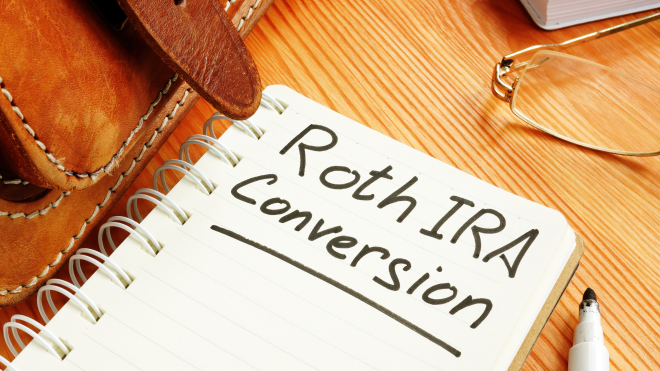Tariff-driven market volatility has been shaking investor confidence, creating real concern, especially for retirees who rely on income from shrinking portfolios. But amid the uncertainty, there could be a silver lining for some mid-career professionals and younger savers: the chance to turn market downturns into long-term advantages. One strategy gaining traction in moments like these? Roth conversions.
As Americans approach retirement, one of the most crucial decisions to make involves the management of their retirement savings and the future tax implications of those savings. For high-net-worth individuals, minimizing taxes and helping ensure a secure retirement income can require more strategic planning.
One such strategy that is gaining attention is the Roth conversion. But is it the right move for you? This blog will break down what Roth conversions are, how they work, and whether or not they are appropriate for those in your financial situation.
What Is a Roth Conversion?
A Roth conversion refers to the process of transferring assets from a traditional retirement account, such as a Traditional IRA or 401(k), to a Roth IRA. While both types of accounts allow for tax-advantaged growth, key differences between them can make a Roth IRA an attractive option for retirement savers. The primary difference lies in how they are taxed.
In a traditional IRA, you contribute pre-tax dollars, and your withdrawals during retirement are taxed as ordinary income. On the other hand, contributions to a Roth IRA are made with after-tax dollars, meaning that you don’t get an immediate tax deduction. However, when you withdraw funds from a Roth IRA in retirement, the withdrawals are generally tax-free, provided certain conditions are met.
Converting from a traditional IRA or 401(k) to a Roth IRA means paying taxes on the amount converted at your current income tax rate. However, once the funds are in the Roth IRA, they will grow tax-free, and qualified withdrawals in retirement will also be tax-free.
Why Consider a Roth Conversion?
- Tax-Free Growth and Withdrawals: The most compelling reason to consider a Roth conversion is the potential for tax-free growth. If you expect to be in the same or a higher tax bracket during retirement, converting to a Roth IRA may allow you to lock in today’s tax rates on the converted amount while enjoying tax-free growth and tax-free withdrawals in retirement.
- No Required Minimum Distributions (RMDs): Traditional IRAs and 401(k)s require account holders to begin taking required minimum distributions (RMDs) starting at age 73. These mandatory withdrawals are taxable, potentially increasing your income tax liability during retirement. In contrast, Roth IRAs do not have RMDs during the account holder’s lifetime, providing more potential flexibility in retirement income planning.
- Estate Planning Benefits: For individuals wishing to leave their heirs a tax-free legacy, a Roth IRA can be a helpful estate planning tool. Beneficiaries can inherit a Roth IRA and enjoy tax-free growth without paying income tax on withdrawals, although they may still be subject to RMDs.
- Flexibility in Retirement: Having a mix of taxable and tax-free retirement income can help give you more flexibility when managing your retirement tax burden. If most of your savings are in tax-deferred accounts, large withdrawals could push you into a higher tax bracket. With a Roth IRA, you can strategically withdraw funds and potentially manage your tax situation more effectively
Who Should Consider a Roth Conversion?
While a Roth conversion can be beneficial for many, it is not suitable for everyone. Here are a few factors to consider:
- Current vs. Future Tax Rates: One of the most critical factors in deciding whether a Roth conversion is right for you is whether you believe your tax rate will be higher or lower in retirement than it is now. If you expect your tax rate to increase—due to changes in tax law, increased income in retirement, or other reasons—a Roth conversion could help lock in the current lower tax rates. On the other hand, if you believe your tax rate will decrease in retirement, a Roth conversion may not be as advantageous.
- Ability to Pay Taxes on Conversion: When you convert assets from a traditional IRA or 401(k) to a Roth IRA, you will owe taxes on the amount converted. If you don’t have the cash on hand to pay the taxes, converting could deplete your retirement savings. Ideally, the tax bill should be paid with funds outside of the IRA to help ensure your retirement accounts continue growing.
- Time Horizon for Growth: The longer your money has to grow in a Roth IRA, the more advantageous the conversion could be. The tax-free growth could compound significantly over time for younger individuals, potentially making a Roth conversion a great long-term strategy. For those approaching retirement, the decision becomes more about tax planning and whether the current tax rates outweigh future tax benefits.
- Estate Planning Goals: A Roth IRA can be a useful estate planning tool. If you want to pass on tax-free retirement funds to your heirs, a Roth conversion may align with your objectives. Remember that converting a large portion of your traditional IRA or 401(k) may result in a significant tax bill today, which might impact your current lifestyle or savings goals.
- Diversification of Tax Exposure: Having a mixture of taxable, tax-deferred, and tax-free accounts can provide a form of tax diversification, giving you flexibility in managing your tax exposure in retirement. This strategy may be particularly appealing for high-net-worth individuals who want to help manage their tax liability more effectively.
Potential Drawbacks of Roth Conversions
While Roth conversions have many benefits, they are not without potential downsides. Here are some factors to consider:
- Immediate Tax Bill: When you convert traditional retirement funds to a Roth IRA, you will owe taxes on the amount converted. Depending on the amount of the conversion, this could result in a large tax bill. For high-net-worth individuals, this tax liability could be significant. It is important to ensure you can cover this tax liability without depleting your other retirement savings.
- Loss of Deductions: Large conversions could push you into a higher tax bracket, making other deductions, credits, or exemptions less beneficial. For example, converting a large amount from a traditional IRA might reduce your eligibility for certain tax credits or increase your Medicare premiums, as they are based on your taxable income.
- Impact on Social Security Taxation: Conversions can increase your taxable income, potentially causing more of your Social Security benefits to be taxed. For some retirees, this could significantly reduce the amount of Social Security income they receive, making it important to carefully assess the potential impact of a Roth conversion on their overall tax situation.
- Conversion Timing: The decision to convert depends heavily on the timing. Tax laws can change, and future tax rates could impact the effectiveness of the conversion strategy. Additionally, market conditions can affect the amount of taxes you’ll pay on the converted funds, as a higher market value would result in a higher tax bill.
Is a Roth Conversion Right for Me?
Ultimately, the decision to convert to a Roth IRA should be based on your unique financial situation, retirement goals, and tax strategy. High-net-worth individuals approaching retirement need to carefully consider factors such as their current tax bracket, expected future tax rates, and how the conversion may impact their long-term retirement income and estate planning.
It is also essential to keep in mind that this decision involves complex tax implications. Since tax laws are subject to change and the decision to convert can have significant financial consequences, it’s crucial to consult with a financial professional who can help you navigate the intricacies of Roth conversions. A well-rounded retirement strategy that includes tax planning, investment management, and estate planning can help ensure that you are making informed decisions that align with your financial goals.
Final Thoughts
Tariff-driven market volatility and rising economic uncertainty are shaking up investor confidence—but for strategic savers, this disruption may actually present a window of opportunity. When market values dip, so do the tax costs associated with Roth conversions—making now a potentially ideal time to evaluate whether this strategy fits into your broader retirement plan.
For high-net-worth individuals, minimizing taxes and maximizing income flexibility in retirement is more important than ever. A well-timed Roth conversion can serve as a powerful tool—not only for long-term tax-free growth but also for estate planning, RMD management, and reducing future tax liabilities in an unpredictable landscape.
That said, the benefits of a Roth conversion depend heavily on your personal financial picture—including your current tax bracket, future income expectations, and overall retirement strategy. Given the evolving legislative and market landscape, it’s essential to make this decision with the support of a fiduciary advisor who understands your goals and the potential impact of today’s economic shifts.
How CKS Summit Group Can Help
At CKS Summit Group, we help guide affluent individuals and families through complex retirement planning decisions. Whether you’re considering a Roth conversion or seeking ways to insulate your wealth from tax and market volatility, our team is here to provide personalized, objective advice tailored to your unique financial situation.
Let’s talk about how we can help turn today’s uncertainty into tomorrow’s opportunity. Schedule a complimentary consultation with us today to get started.
Frequently Asked Questions (FAQs)
1. How much should I convert to a Roth IRA in one year?
The amount you should convert to a Roth IRA in any given year depends on your financial situation, including your current tax bracket, long-term retirement goals, and ability to pay the taxes on the conversion without impacting other savings. Converting a large amount could push you into a higher tax bracket, so it may be wise to spread out conversions over several years to manage the tax impact effectively. A gradual conversion strategy can help minimize tax liabilities while maximizing the benefits of tax-free growth in a Roth IRA.
2. Are there any age restrictions for Roth IRA conversions?
There are no age restrictions for Roth IRA conversions. Whether you’re in your 40s or approaching retirement, you can convert funds from a traditional IRA or 401(k) to a Roth IRA at any age. However, suppose you’re over 70½ and still working. In that case, the only consideration is helping ensure you’re eligible to contribute to a Roth IRA, as contributions to a Roth are limited by income and filing status. Regardless of your age, the key factor is whether converting aligns with your long-term retirement strategy.
3. What happens if I don’t meet the tax-free Roth IRA withdrawal requirements?
To enjoy tax-free withdrawals from a Roth IRA, you must meet two conditions: first, you must be at least 59½ years old, and second, your Roth IRA must be open for at least five years. If you don’t meet these requirements, you may still be able to withdraw contributions (but not earnings) tax and penalty-free. However, withdrawing earnings before age 59½ or before the account is five years old could lead to taxes and possibly an additional 10% penalty. Planning conversions with these requirements is important to help avoid unintended tax consequences.
4. Can I undo a Roth conversion if I change my mind?
Once you’ve completed a Roth conversion, it is typically irreversible. The IRS does not allow you to “undo” a Roth conversion, though a provision in the past (the recharacterization rule) allowed individuals to reverse a conversion. However, the recharacterization option was eliminated for Roth conversions after 2017. Therefore, it’s crucial to carefully evaluate your decision and consult with a financial advisor before moving forward with a Roth conversion to help ensure it aligns with your financial plan.
5. How will a Roth conversion affect my Medicare premiums?
Roth conversions can impact your Medicare premiums because they increase your taxable income in the year of the conversion. Medicare premiums are based on your Modified Adjusted Gross Income (MAGI), and higher income levels can result in higher premiums. The Medicare Income-Related Monthly Adjustment Amount (IRMAA) could cause you to pay more for Part B and Part D coverage if your income exceeds certain thresholds. This is an important consideration for individuals approaching Medicare age, as large Roth conversions could potentially increase their healthcare costs.
Disclaimer: The information provided in this blog is for educational purposes only and should not be construed as specific investment advice. Always consult with a qualified financial advisor before making any investment decisions.



